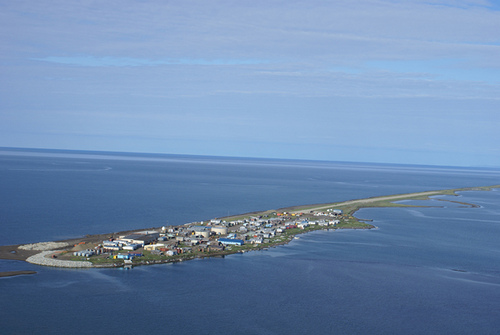By Katrina Marland

On an island in Alaska’s Northwest Arctic Borough is a town called Kivalina. It’s a small community of just over 400 people, many of them Inupiats. Despite the rural location and a population that keeps mostly to itself, Kivalina is a town that we should all be paying attention to.
The barrier island on which the town sits is disappearing. As I mentioned in my post about the changes in the Arctic tundra, the climate is warming more rapidly in the far north than it is for the rest of the world. Warmer temperatures have meant the ice that usually protects the island during the storm season isn’t freezing in time, and more intense storms are eroding Kivalina’s eight-mile barrier island, all while the sea level is rising. The land is literally vanishing.
In 2006, the Army Corps of Engineers found that the community only has between 10 and 15 years before the island becomes uninhabitable, and that’s only if there was no further erosion. The report also found that it would cost $95-$125 million to relocate the town, and as time would come to tell, no one was willing to foot the bill.
But the town fought back. In 2008, the town sued a number of energy companies — including ExxonMobil, BP America and Chevron Corporation — for $400 million in damages because of their contributions to the climate changes that would doom their little town. The U.S. District Court dismissed the case in 2009, stating that a politically charged topic like climate change could only be addressed by the Obama administration.
I admit, even I would have been skeptical of a good outcome. Not because I doubt that those companies’ actions have contributed to global warming, but because I know that they aren’t singlehandedly responsible for it. For all that we complain (often with good reason) about companies that deal in oil and coal, the truth of the matter is that they only exist because we all use them. In fact, this was part of the defense’s argument (watch the video here).
This year, Kivalina is reviving its lawsuit. If successful, it will set a precedent for the thousands of other coastal communities that will find themselves in danger over the next few decades because of climate change. It will be interesting to see if the legal system determines that corporations are at fault — or we are. Either way, it can be only a hollow verdict for the centuries-old town of Kivalina when, in just a decade, it will have slipped under the sea.